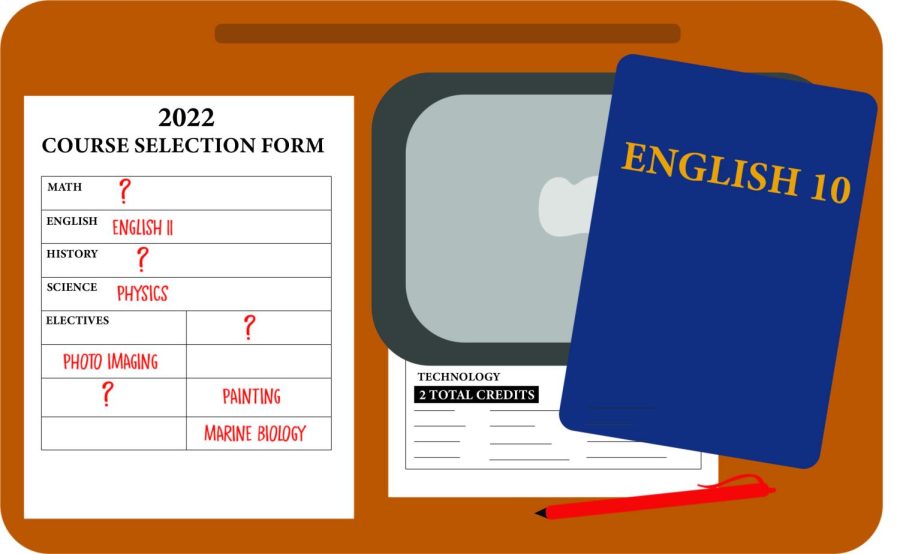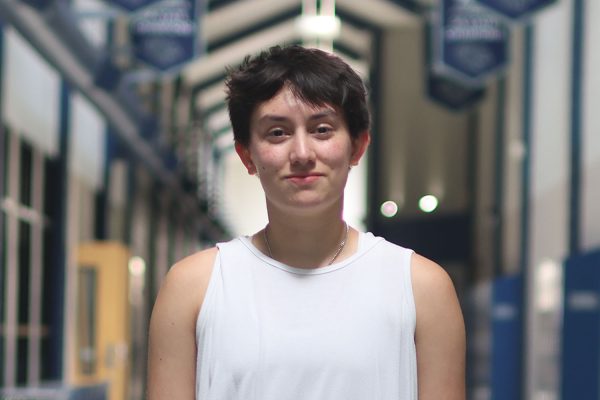Counselor gives advice on course selection
Guidance Counselor Chris Wallace helps answer questions about students’ course selections
January 16, 2022
JagWire: First question, for students that are on the fence about particular classes, what advice would you provide them with?
Counselor Chris Wallace: I think the first thing is to focus on graduation credits. What is it that you need in order to earn your diploma, and trying to specialize in those areas and really pick out good options to meet the fine arts, technology, and communications credits in some of those categories. The second thing would be to talk with teachers and use some of the resources that are on the website as well as, just conversations that those teachers who teach some of the classes that maybe you have questions about, to try and get an idea of whether there’s some good options, and then come in and talk to us counselors. We’re not experts, but we definitely know a lot about courses. We don’t know everything about courses, but we certainly work with every course that’s offered here at Mill Valley to some degree or another. So we’re kind of a good database of information that can try and help students identify options that would be a good fit based on their interests.
JW: From your perspective, does it look better to take a tougher class such as honors or AP and do a poor job, or take a simpler class and get higher grades?
CW: That’s by definition, a million dollar question because what is it? The cost and benefit of both are hard to foreshadow and predict. So Kansas University and Kansas State both moved away from test scores being counted for scholarship purposes. Knowing that that’s the case, added emphasis needs to be put on GPA, because that is one of the criteria that they use for scholarship consideration. So if the risk is related to grades, meaning taking the harder course you’re more likely to get a worse grade, then there might be some benefit to kind of try and protect your GPA a little bit and look at some lighter options. If it’s time related, for example, I might have to spend more time working on the scores, however if you’re still confident in your ability to get the A then I would always lean towards taking the more challenging course. The preparation that comes from taking those challenging offerings in gearing up for college or for future opportunities, is far more advantageous than not.
JW: What types of students would you recommend for CTEC? And what types of students usually apply?
CW: What I know [is that] CTEC is doing a great job is its industry leading opportunities. So what that means is you’re not really there to just try something. Yes, you are trying new courses and doing new things that you probably don’t have a lot of experience with; but the types of experiences that you’re getting are very reminiscent of the things that you will be doing at a professional level. You’re getting full hands-on experience that can then be directly related to professions that are out there that use that technology and do those types of things on the job. So I think the students that are best suited for CTEC are the ones that are very career-oriented, that are thinking about their life as a professional, that are really motivated and eager to like look into professional experiences like internships and job shadows and things like that, and are just wanting to kind of capitalize on the opportunities now, rather than wait until much later on down the road to explore those areas.
JW: So, you would say that CTEC is much more focused in particular areas, whereas classes at Mill Valley may not be as focused.
CW: Yeah, in general CTEC offers those three strands that have very specific career applications for them. They’re not really broad category courses that kind of translate to lots of different areas. Let’s take engineering for example. Engineering is a part of the emerging technology strand at CTEC. There are engineers in tons of different industries, tons and tons and tons from software to aviation to technology or to computers. The list goes on and on but if you’re taking an engineering course, you’re preparing for engineering types of work.
JW:If a class isn’t necessary for a student’s future career path, should they bother taking that class?
CW: One of the criteria for selection to see is that you are there and it does line up with career paths and interests based on your individual plan of study. So that’s actually an application criteria for CTEC, that it is of interest to you and that it is a good fit for you based on your skills and likes. So, in general, I would say it is important that the students that are choosing that as an option, are not only passionate about that subject but also have realistic opportunities to pursue that at a professional level later on.
JW: When should someone consider doubling up on classes, for example, taking AP Chemistry and AP Physics at the same time?
Wallace: I think anytime an area of interest or something that you’re passionate about, the opportunity to take more classes in it is always something good to do. So a band student who’s in Concert Band or Symphonic Band and wants to do Jazz Band, that’s a great opportunity; but if a student knows that something science related is in their future, and they have a passion for that, well, why not take multiple science classes, especially if you have the time that you can dedicate towards both of those subjects. However, if you’re just adding rigor for the sake of[working] ahead or [expediting] the process or something like that there’s no rush. You have four years. I would advise it’s better to spread out the rigor as evenly as possible and ensure that you are in quality courses from freshman year through senior year, as opposed to just trying to load up on one year.
JW: Then to the point of AP classes, what is the purpose of an AP course? And what is the difference between an AP course and a regular course?
CW: A lot of that can be found in our class comparison charts that we have on the counseling website. The basic idea is the AP courses are taught at a college level, and it’s giving students that opportunity to build up some of those skills that should directly translate to things that they would need at the college level.
JW:What do you think colleges are looking for when students apply based on the classes and courses they’ve chosen?
CW: The number one aspect that we hear over and over is [colleges] want well-rounded students. We certainly want to see students take rigorous courses and challenge themselves and really build up their academic resume as much as they can. Additionally, we really also want to encourage students to be involved, either with community service or volunteer work with part time jobs and getting involved with things that way. Also, building up a professional experience with internships, sports and activities, clubs, organizations, to build a resume or a portfolio that shows that you are a well rounded individual. Jobs nowadays have become a lot more intertwined and the skills that you need to do one area of work often have a lot of similarities to other areas. [Applying to colleges is] really about building a well-rounded portfolio of things that you can expose yourself to so that, as you make that transition to college and the workforce, you have a well-rounded set of skills to fall back on to help you with those transitions.
JW:Based on schedules, what goes into the counselors building schedules for students?
CW: We have our deadline [for when student class election is due]. When the deadline comes we input all of the course information, everything that the students request gets uploaded. We also run the numbers: how many students are requesting certain courses? Based on that breakdown, we build our master schedule, which is, literally, how many math teachers do we have? How many sections of each math class and what hours is it going to be taught so that we can try and accommodate all of the requests to as much of the level as possible? If there’s a course and only one student in the student body requested, it’s almost entirely not going to be an option for the upcoming year, but if we can get enough numbers in class, then we do everything we can to try and get that on the schedule somewhere so that those students can take that course. Once we have that master schedule built, Skyward runs the system and assigns all of those course requests into those respective blocks. After, we go in and clean up any of the mistakes or errors. We have to finish or fix things that are full, and then go to those alternate choices and fill in those missing pieces that way.
JW: Lastly, is there anything else you would like to add?
CW: A couple things: the number one important thing for students to do is to meet the deadline. However, they do not have to be early with this process. There is no advantage or benefit to turning your course guide in the minute after we give you that information. If anything, that’s not the advice that we would offer. We would encourage you to take time to have conversations with your parents, with your teachers, and really make sure that you’re making the right choices. So that we cut down on the amount of changes and mistakes and things that we have to clean up later on. Because we actually find that the students who rush through and submit it are the ones who need to circle back later. This is one instance where being patient and actually processing things a little bit more is to your benefit, as opposed to your detriment. We do not make it first come first serve; it is entirely luck of the draw based on what Skyward assigns. Additionally,, like I said, the only way to ensure that you get your choices is to get your[course guide] in on time. The sooner you know your future options for either colleges or degrees or careers that you’re wanting to get into, the easier it can be to align your high school schedule to plan and prepare for those opportunities. We don’t want to put pressure on students to have to make life altering decisions if they’re not ready to. It’s okay to still not know what you want to do when you grow up, but if you can start to formulate those plans it can often be to your benefit when it comes to things like course selection because, now, you have a guide to courses to help build up experience before going to college. Again, everyone is at a different phase of life at this time and there’s no pressure or rush or urgency to figuring it all out. However, remember you start brainstorming, the sooner you can make the whole process easier.
JW: And, as always, students can always come to the counselors if they have any questions?
CW: Yes, we’re always happy to try and help.










